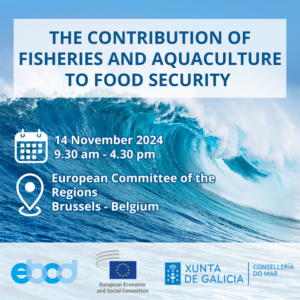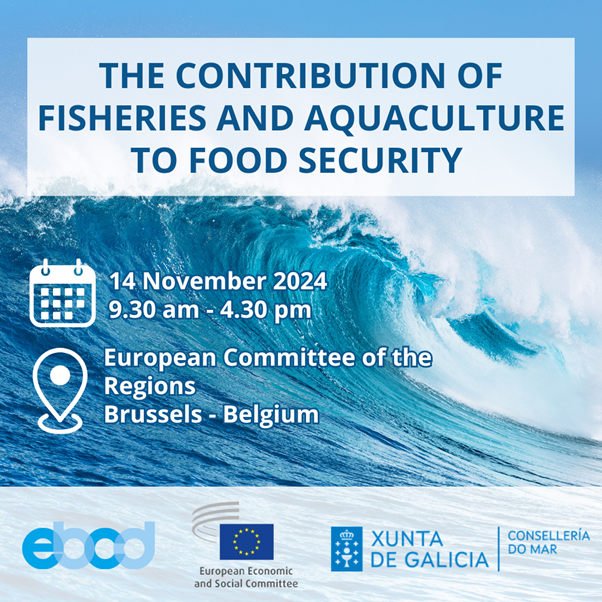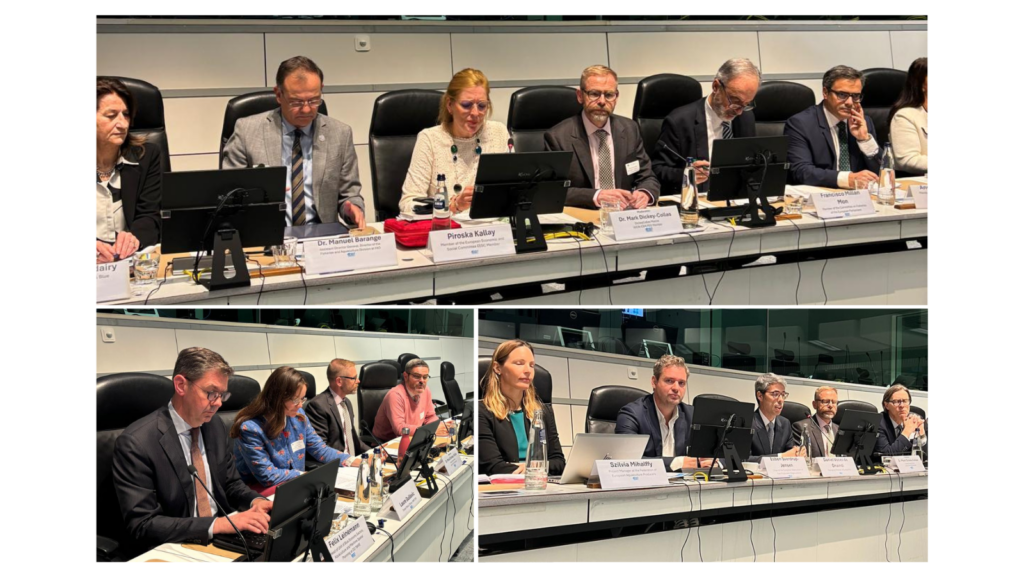
Engagement Hub / Events
The Contribution of Fisheries and Aquaculture to Food Security

November 14, 2024 @ 08:00 – 17:00 GMT
A full-day conference on the Contribution of Fisheries and Aquaculture to Food Security, organised on 14 November 2024 by the European Bureau for Conservation and Development (EBCD) in partnership with the European Economic and Social Committee (EESC) and sponsored by the Xunta de Galicia, highlighted the critical role of fisheries and aquaculture in global and European food security, addressing challenges such as climate change, biodiversity loss, and geopolitical disruptions. Aquatic foods were framed as essential to sustainable food systems, offering high nutritional value with a lower environmental impact than terrestrial animal-based foods. As global demand for food rises, aquatic foods can play a pivotal role in combating malnutrition, ensuring livelihoods, and addressing climate and biodiversity crises.
The conference aimed at addressing the issue of aquatic foods and food security in the framework of the upcoming European Ocean Pact announced by the European Commission. For more information consult the agenda and the full event report on EBCD website.
The Aquatic Blue Food Coalition at the Contribution of Fisheries and Aquaculture to Food Security
The Aquatic Blue Food Coalition was please to support this event and participate with an intervention provided by Chair Jón Erlingur Jónasson.

5 Key Takeaways from the Event
- Role of Aquatic Foods in Food Security and Sustainability: Aquatic foods, including fisheries and aquaculture products, play a crucial role in addressing global food security challenges. They are rich in essential nutrients, have a lower carbon footprint than other animal protein sources, and support the UN Sustainable Development Goals (SDGs). The sectors must be integrated into broader food system policies to tackle global malnutrition, hunger, and climate challenges effectively.
- Challenges and Opportunities in Fisheries and Aquaculture: The fisheries sector is under pressure due to ageing fleets, regulatory burdens, declining fish stocks in some regions, and spatial constraints from competing maritime uses. Meanwhile, the aquaculture sector struggles with regulatory complexity and stagnant production in the EU. However, sustainable aquaculture presents significant growth potential if supported by clear policy frameworks, innovation, and investments.
- Necessity for Resilient and Sustainable Food Systems: Building resilience in aquatic food systems is essential for addressing disruptions caused by climate change, geopolitical crises, and biodiversity loss. This requires systemic approaches emphasising connectivity, diversity, innovation, and inclusivity. Investments in small-scale producers and the adoption of ecosystem-based management practices are critical for sustainability and equity.
- Policy and Governance Enhancements: The conference highlighted the importance of revising EU policies such as the Common Fisheries Policy to balance environmental, social, and economic priorities. Simplifying regulations, embracing technological advancements like AI in fisheries management, and ensuring fair competition for imported aquatic products are vital steps for a robust aquatic food system.
- Global Collaboration and Innovation: International cooperation and multi-stakeholder engagement are pivotal for transforming aquatic food systems. Initiatives like the Blue Food Assessment and the Blue Transformation strategy emphasizes the need for inclusive policies, innovative solutions, and resource allocation to enhance the contribution of aquatic foods to global food systems while addressing climate and equity challenges.
